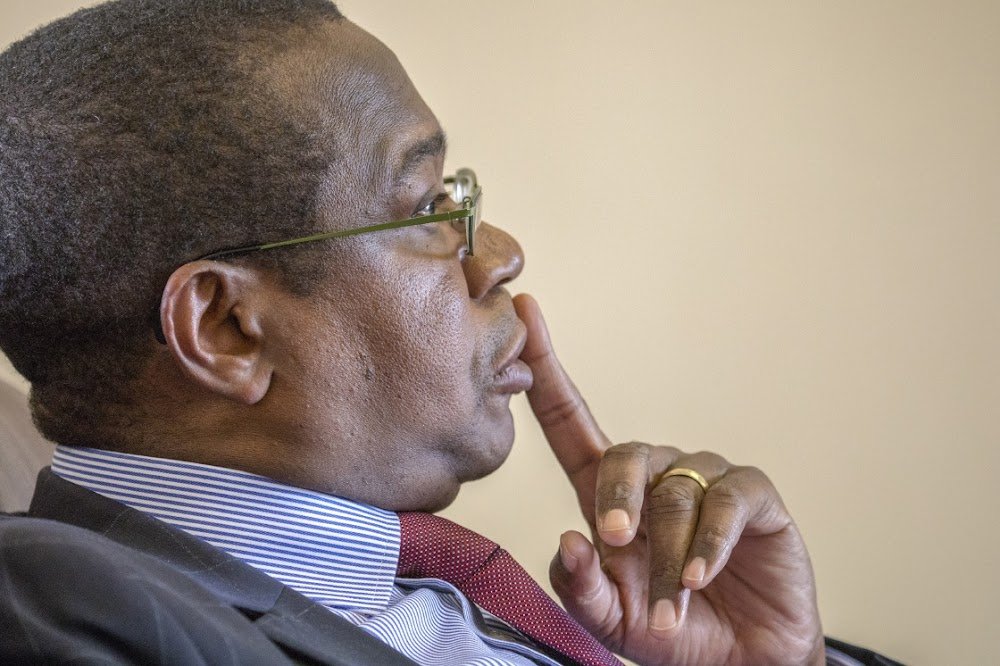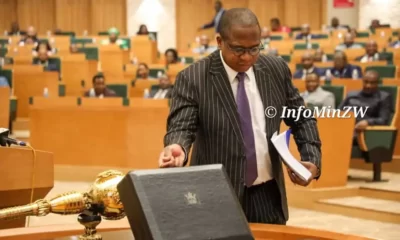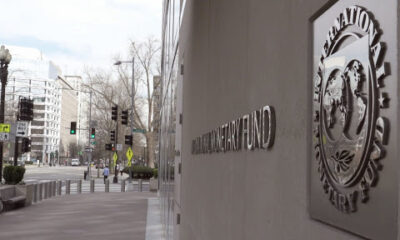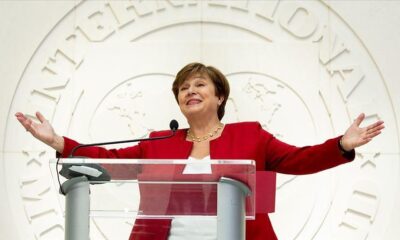
News
Controversy swirls around Zim’s US$961m IMF windfall
Published
3 years agoon
By
NewsHawksWhere is the money?
THE lack of transparency surrounding how the Zimbabwean government has spent the US$961 million Special Drawing Rights (SDR) windfall from the International Monetary Fund (IMF) is raising serious questions on matters of accountability and prudent public finance management, The NewsHawks can report.
MARY MUNDEYA
This comes at a time Finance minister Mthuli Ncube is under fire for not honouring his promise to consult Parliament before disbursing the SDR funds.
SDRs are an international reserve asset defined and maintained by the IMF meant to supplement the official reserves of member countries. On 23 August last year, Zimbabwe received US$961m worth of SDR funds.
This amount was deposited into the government’s account at the Reserve Bank of Zimbabwe (RBZ). There was great optimism among Zimbabweans that the SDR funds would provide some respite to the prevailing social and economic challenges.
In a joint Press statement released on 23 August 2021, Treasury and the RBZ promised to “prudently and with utmost accountability, support the social sectors, namely health, education, and the vulnerable groups; productive sectors that include industry, agriculture and mining; infrastructure investment covering roads and housing; and foreign currency reserves and contingency fund and support for our domestic currency and macro-economic stability”.
The official stance was widely received as a step in the right direction.
However, almost a year later, amid a growing outcry by Parliament, civil society organisations and good corporate governance activists, Minister Ncube on 18 August 2022 revealed that a significant chunk of the SDR funds amounting to US$311m had already been spent in the period from September 2021 to June 2022.
Ncube said US$71m had gone towards the procurement of Covid-19 vaccines.
A vaccine rollout programme had gobbled up US$6m while US$10m had been used in the procurement of Covid-related medical testing equipment. In addition, US$80m had been used towards a social protection programme to support agricultural production for rural and peri-urban households.
A total of US$144m had been allocated to the Road Development Programme encompassing Harare-Beitbridge Road, Masvingo Road Interchange Development Project and the Emergency Road Rehabilitation Programme (ERRP).
An investigation by The NewsHawks with support from the Voluntary Media Council of Zimbabwe Investigative Journalism Fund into the utilisation of SDR funds found that unlike all the other SDR-funded projects, there was no trace as to how the US$80m disbursed towards the Agriculture Productive Social Protection Scheme meant for rural and peri-urban households had been used.
In a bid to get clarity on how the US$80m was channeled towards the support for the Agriculture Productive Social Protection Scheme for rural and peri-urban households, The NewsHawks reached out to the chief director of strategic planning in the ministry of Lands, Agriculture, Fisheries, Water, Climate and Rural Development, Clemence Taderera Bwenje, who showed no knowledge of the fund and directed us to the permanent secretary.
“You mean US$80m for social protection? Was it given to the ministry of Agriculture or people were being given as cash? I’m only aware of the US$30m for horticulture and US$20m for the smallholder farmer irrigation schemes, all of which are yet to be disbursed from SDR funds,” he said.
Ministry of Lands, Agriculture, Fisheries, Water, Climate and Rural Development permanent secretary John Bhasera failed to give an account on how the US$80m was used.
After calling his mobile number 15 times over a period of seven days and getting no response, we resorted to sending a message on WhatsApp, which he replied to by promising to draft a response.
Two weeks down the line, no response was forthcoming and none of our numerous direct voice and WhatsApp calls were being responded to.
On 26 September, Bhasera responded to a WhatsApp message we had sent him and indicated that he was in a meeting.
In a follow-up call two days later, Bhasera said: “We are still working on your responses. It’s not right that you send us questions and expect an instant response. We are busy people. I’m in the field and someone from my office is working on giving you the answers you need.”
During the call, when we reminded him that it had been two weeks since we submitted the questions and we inquired as to when we could expect a response, Bhasera said he could not make any guarantees and he proceeded to abruptly terminate the call.
When we contacted him again via a direct voice call on 30 September, he asked us to re-send our questions, which we did, but he has not sent his response.
Upon further investigations, The NewsHawks established that the US$80m was used to finance the heavily politicised Pfumvudza/ In twasa presidential inputs scheme.
Farmers from different areas who spoke to The NewsHawks on condition of anonymity for fear of reprisals complained that they did not get any cushioning from the purported Pfumvudza/Intwasa agricultural social protection scheme for rural and peri-urban households.
They also voiced concern over how the programme is being used by politicians to gain mileage ahead of the 2023 general elections.
“As subsistence farmers that are still grappling with effects of the Covid-19 pandemic and the recurrent droughts we have been experiencing, we are disappointed by the partisan distribution of the Presidential Input Scheme here in Headlands’ Masunzwe district.”
“There has been a lot of jostling of candidates who are eyeing the councillor and MP positions in the upcoming 2023 polls and if you are known to be in support of anyone who is not the incumbent councillor Samanyanga or MP Chingosho, you are guaranteed that you will not get anything,’’ said a farmer in the Headlands ward 6 area.
“Known opposition party supporters here have never benefitted from the presidential Pfumvudza inputs programme. Agricultural extension officers in cahoots with local ruling party leaders are politicising the distribution of the Pfumvudza inputs. Our families are on the verge of starving as we cannot afford basic inputs,” said another subsistence farmer from the Mapiravana ward 1 area of Chirumhanzu South.
Other farmers who are engaged in urban farming in Harare’s Mabvuku, Warren Park, Waterfalls and Mbare suburbs also spoke about how they had not been cushioned from the politicised Pfumvudza/ Intwasa presidential inputs scheme after the Covid-19 pandemic.
“I have been farming on this piece of land for close to 10 years now. and I have never received any Pfumvudza inputs. Last year, there was an ongoing buzz of another programme called ‘rima’ something (plant something), which was for Zanu PF youths who were given various vegetable seedlings and many of our young people also did not get anything,” said Pedzisai Hungwe, an elderly farmer in Harare’s Mabvuku suburb.
“We only heard about Pfumvudza for urban farmers on radio, and we were hoping to get something, but the Zanu PF cell chairman who was responsible for compiling beneficiary names left us out. We will see how this year goes,” said Simbarashe Mukono, a resident of Mbare suburb.
Narrating some of his government’s achievements (which include the Pfumvudza programme) to Zanu PF supporters at a rally held in Epworth on 12 February this year ahead of the 26 March by-elections, President Emmerson Mnangagwa confirmed the abuse and thievery that have engulfed the Pfumvudza inputs scheme, saying: “As the government, we sat down and agreed to implement the Pfumvudza programme so that you benefit. In Harare, we distributed Pfumvudza agricultural inputs to 23 330 households and your leaders told us that the beneficiaries used the inputs on 8 185 hectares of land. It’s unfortunate that some of the inputs have been failing to reach the intended beneficiaries due to corruption and thievery, but we would have availed them,’’ the President told the crowd, which booed in disapproval.
On 28 September, The NewsHawks also reached out to the ministry of Finance and Economic Development permanent secretary, George Guvamatanga, who asked for questions in writing, which we sent to him but never got a response.
The NewsHawks was seeking official clarity on the agricultural projects which benefitted from the US$80 million that was funded via the SDR purse. Guvamatanga did not answer the more than 15 direct voice and WhatsApp calls we made to him as a follow-up to the questions we had submitted.
Sources in the ministry of Finance and Economic Development confirmed The NewsHawks’ investigative findings and indicated that the funds had been used to import tonnes of fertilizer from Russia and the purchase of other agriculture-related products for the Pfumvudza/Intwasa presidential inputs scheme.
A socio-economic justice advocacy group, the Zimbabwe Coalition on Debt and Development (Zimcodd), also corroborated The NewsHawks’ findings, saying it was unfortunate that a fund that was supposed to improve the lives of the marginalised had been spent on the heavily politicised presidential inputs scheme that is providing mileage for politicians ahead of the 2023 general elections.
“SDR allocations are a crucial windfall and should be used to fund improvement of citizens’ livelihoods, especially the marginalised and it’s unfortunate that as much as the presidential inputs scheme is a notable venture for cushioning farmers around the country, its politicisation has led to the benefit of politicians ahead of the 2023 elections compared to the general marginalised people in various communities,” Zimcodd said.
The civil society organisation further lamented how the current SDR allocation had relatively failed to have an effect on Zimbabwe’s economy.
“The 2009 SDR allocation to Zimbabwe had this notable effect. The current episode, however, is marred by secrecy from the ministry of Finance on use of the funds and this discourages public trust and defies the principles of good governance and prudent financial management. The ministry of Finance should endeavour to provide granular information on this expenditure for any comprehensive impact assessment to be done,” added Zimcodd.
Zimbabwe Farmers’ Union director Paul Zacharia defended the channeling of the US$80m SDR money towards the Pfumvudza/ Intwasa presidential inputs programme, arguing that it was government money.
“All the inputs that have been distributed for the Pfumvudza/Intwasa programme rural and peri-urban farming set-ups or settlements are actually funded by government and SDR funds are government money because they (the government) are the ones who administer it,” he said.

Covid-19 vaccine saga
The NewsHawks also zeroed-in on the US$71m that was reportedly disbursed towards the procurement of Covid-19 vaccines from the US$311m utilised funds.
Our investigation found a mismatch between how much was said to have been spent on the procurement of vaccines and the number of vaccines Zimbabwe actually purchased. In the 2022 National Budget statement, Finance minister Ncube said the government had utilised budget savings of US$100m from the previous year in addition to current budgetary support for Covid-19 vaccine procurement.
Ncube added that as at the end of September 2021, the government had spent about US$204 million on the procurement of 17 million vaccines and syringes — which is contrary to what he had previously revealed at a pre-budget seminar held in October 2021 when he said: “Government has so far spent US$127 million to procure over 16 million Covid-19 vaccine doses and syringes, since the mass vaccination programme began early this year.”
Thus, apart from the US$100m surplus funds, by 25 November 2021 Zimbabwe had received a total of US$150m from various development partners, aimed at fighting the Covid-19 pandemic.
Our investigation revealed that, to date, Zimbabwe has purchased 20 190 000 Covid-19 vaccines at a total cost of US$128 263 750 and received a further 2 215 000 vaccines in the form of donations from China, Russia and India.
In addition, the investigation revealed that 16.2 million syringes had been bought at a total cost of US$1 024 000 while a donation of 1 003 200 syringes had been received from China. Therefore, the claim that the US$100m (from the set-aside surplus) was added to a part of the US$150m Zimbabwe got from various development partners, plus the US$71m from SDR funds to buy 20 190 000 vaccines does not stand up to scrutiny.
It leaves close to US$60m unaccounted for. A breakdown of all the purchased and donated Covid-19 vaccines and syringes from the ministry of Health and Childcare confirmed and corroborated In the 2022 National Budget statement, Finance minister Ncube said the government had utilised budget savings of US$100m from the previous year in addition to current budgetary support for Covid-19 vaccine procurement.
Ncube added that as at the end of September 2021, the government had spent about US$204 million on the procurement of 17 million vaccines and syringes — which is contrary to what he had previously revealed at a pre-budget seminar held in October 2021 when he said: “Government has so far spent US$127 million to procure over 16 million Covid-19 vaccine doses and syringes, since the mass vaccination programme began early this year.”
Thus, apart from the US$100m surplus funds, by 25 November 2021 Zimbabwe had received a total of US$150m from various development partners, aimed at fighting the Covid-19 pandemic.
Our investigation revealed that, to date, Zimbabwe has purchased 20 190 000 Covid-19 vaccines at a total cost of US$128 263 750 and received a further 2 215 000 vaccines in the form of donations from China, Russia and India. In addition, the investigation revealed that 16.2 million syringes had been bought at a total cost of US$1 024 000 while a donation of 1 003 200 syringes had been received from China.
Therefore, the claim that the US$100m (from the set-aside surplus) was added to a part of the US$150m Zimbabwe got from various development partners, plus the US$71m from SDR funds to buy 20 190 000 vaccines does not stand up to scrutiny.
It leaves close to US$60m unaccounted for. A breakdown of all the purchased and donated Covid-19 vaccines and syringes from the ministry of Health and Childcare confirmed and corroborated The NewsHawks’ findings, indicating that indeed Zimbabwe spent a total of US$128 263 750 for the 20 190 000 vaccines it purchased.
The NewsHawks reached out to ministry of Finance spokesperson Clive Mphambela concerning the mismatch in the vaccine procurement figures.
He said he had been out of the country for the past two weeks and was awaiting a response from relevant departments.
However, sources in the Finance ministry revealed that the variance in vaccine procurement might have been caused by insurance and freight charges that were usually not accounted for in most instances.
Economist and executive director of Africa Economic Development Studies (AEDS) Professor Gift Mugano said the statement released by Treasury on the utilisation of SDR funds was not clear on how the US$71m was spent towards the procurement of Covid-19 vaccines.
“The US$71m invested towards the procurement of Covid-19 vaccines is not clear because we know that government mobilised US$100m before this money was provided to secure vaccines for Covid-19 which were supposed to vaccinate at least 60% of the population, which is about 10 million people,” said Mugano.
“If you look at the records of how many people have been vaccinated, we are looking at somewhere around five million, which means that the US$100m that was set aside and secured before we even got the SDR funds, is still there. So there is no wisdom of again drawing down US$71m for vaccination support,’’ Mugano said.
Meanwhile, the maladministration of SDR funds has come to the attention of the Budget and Finance Portfolio Committee, which is pushing that the Finance minister give oral evidence on how the money has been spent so far and that the Auditor-General thoroughly audit the utilisation of the IMF windfall.
“The committee called upon the minister to include a report on the utilisation of SDRs so far in his mid-term fiscal policy review statement which he did and we are scheduled to meet him so that he explains what he wrote to us. Moreover, the committee also called upon the Auditor-General to thoroughly audit the utilisation of the SDRs,” Buhera Central MP and chairperson of the Budget and Finance portfolio committee, Mathew Nyashanu, said.
In the 2022 National Budget statement, Finance minister Ncube said the government had utilised budget savings of US$100m from the previous year in addition to current budgetary support for Covid-19 vaccine procurement.
Ncube added that as at the end of September 2021, the government had spent about US$204 million on the procurement of 17 million vaccines and syringes — which is contrary to what he had previously revealed at a pre-budget seminar held in October 2021 when he said: “Government has so far spent US$127 million to procure over 16 million Covid-19 vaccine doses and syringes, since the mass vaccination programme began early this year.”
Thus, apart from the US$100m surplus funds, by 25 November 2021 Zimbabwe had received a total of US$150m from various development partners, aimed at fighting the Covid-19 pandemic.
Our investigation revealed that, to date, Zimbabwe has purchased 20 190 000 Covid-19 vaccines at a total cost of US$128 263 750 and received a further 2 215 000 vaccines in the form of donations from China, Russia and India.
In addition, the investigation revealed that 16.2 million syringes had been bought at a total cost of US$1 024 000 while a donation of 1 003 200 syringes had been received from China.
Therefore, the claim that the US$100m (from the set-aside surplus) was added to a part of the US$150m Zimbabwe got from various development partners, plus the US$71m from SDR funds to buy 20 190 000 vaccines does not stand up to scrutiny.
It leaves close to US$60m unaccounted for. A breakdown of all the purchased and donated Covid-19 vaccines and syringes from the ministry of Health and Childcare confirmed and corroborated The NewsHawks’ findings, indicating that indeed Zimbabwe spent a total of US$128 263 750 for the 20 190 000 vaccines it purchased. The NewsHawks reached out to ministry of Finance spokesperson Clive Mphambela concerning the mismatch in the vaccine procurement figures.
He said he had been out of the country for the past two weeks and was awaiting a response from relevant departments.
However, sources in the Finance ministry revealed that the variance in vaccine procurement might have been caused by insurance and freight charges that were usually not accounted for in most instances.
Economist and executive director of Africa Economic Development Studies (AEDS) Professor Gift Mugano said the statement released by Treasury on the utilisation of SDR funds was not clear on how the US$71m was spent towards the procurement of Covid-19 vaccines.
“The US$71m invested towards the procurement of Covid-19 vaccines is not clear because we know that government mobilised US$100m before this money was provided to secure vaccines for Covid-19 which were supposed to vaccinate at least 60% of the population, which is about 10 million people,” said Mugano.
“If you look at the records of how many people have been vaccinated, we are looking at somewhere around five million, which means that the US$100m that was set aside and secured before we even got the SDR funds, is still there. So there is no wisdom of again drawing down US$71m for vaccination support,’’ Mugano said.
Meanwhile, the maladministration of SDR funds has come to the attention of the Budget and Finance Portfolio Committee, which is pushing that the Finance minister give oral evidence on how the money has been spent so far and that the Auditor-General thoroughly audit the utilisation of the IMF windfall.
“The committee called upon the minister to include a report on the utilisation of SDRs so far in his mid-term fiscal policy review statement which he did and we are scheduled to meet him so that he explains what he wrote to us. Moreover, the committee also called upon the Auditor-General to thoroughly audit the utilisation of the SDRs,” Buhera Central MP and chairperson of the Budget and Finance portfolio committee, Mathew Nyashanu, said.
The NewsHawks’ findings, indicating that indeed Zimbabwe spent a total of US$128 263 750 for the 20 190 000 vaccines it purchased.
The NewsHawks reached out to ministry of Finance spokesperson Clive Mphambela concerning the mismatch in the vaccine procurement figures. He said he had been out of the country for the past two weeks and was awaiting a response from relevant departments.
However, sources in the Finance ministry revealed that the variance in vaccine procurement might have been caused by insurance and freight charges that were usually not accounted for in most instances.
Economist and executive director of Africa Economic Development Studies (AEDS) Professor Gift Mugano said the statement released by Treasury on the utilisation of SDR funds was not clear on how the US$71m was spent towards the procurement of Covid-19 vaccines.
“The US$71m invested towards the procurement of Covid-19 vaccines is not clear because we know that government mobilised US$100m before this money was provided to secure vaccines for Covid-19 which were supposed to vaccinate at least 60% of the population, which is about 10 million people,” said Mugano.
“If you look at the records of how many people have been vaccinated, we are looking at somewhere around five million, which means that the US$100m that was set aside and secured before we even got the SDR funds, is still there. So there is no wisdom of again drawing down US$71m for vaccination support,’’ Mugano said.
Meanwhile, the maladministration of SDR funds has come to the attention of the Budget and Finance Portfolio Committee, which is pushing that the Finance minister give oral evidence on how the money has been spent so far and that the Auditor-General thoroughly audit the utilisation of the IMF windfall.
“The committee called upon the minister to include a report on the utilisation of SDRs so far in his mid-term fiscal policy review statement which he did and we are scheduled to meet him so that he explains what he wrote to us. Moreover, the committee also called upon the Auditor-General to thoroughly audit the utilisation of the SDRs,” Buhera Central MP and chairperson of the Budget and Finance portfolio committee, Mathew Nyashanu, said.
You may like














